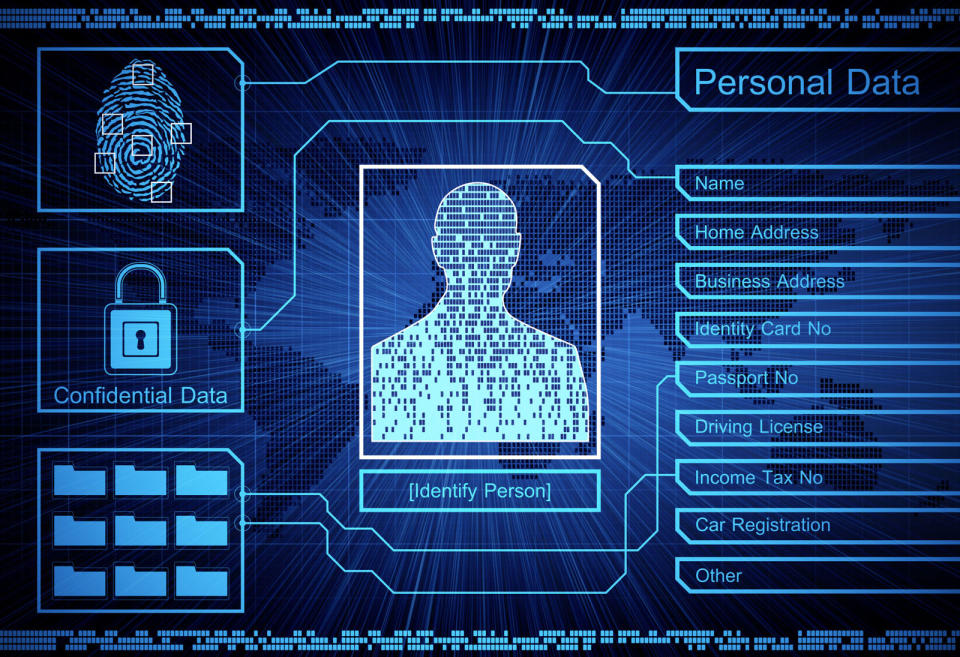How police are using corpses to unlock phones
Privacy, we never knew you.
If you've ever imagined a scenario where police demand you unlock your phone and thought, "Over my dead body!" — we have bad news for you. Here in our absurd dystopian future, having a phone means that upon your demise you could find yourself participating -- limp and lifeless -- in a legal search and seizure of your own digital property.
Police in Largo, Florida, recently tried to use a dead man's finger to open his phone. This was to the complete astonishment of his family and probably also the staff at the Sylvan Abbey Funeral Home. Detectives just rolled right in with Linus F. Phillip's phone and asked staff where his corpse was. They then attempted to unlock his phone by pressing his hands and fingers on to the fingerprint sensor.
The dead man's fiancée, Victoria Armstrong, told press, "I just felt so disrespected and violated."
Mr. Phillip, an unarmed black man, was shot and killed outside a gas station after police claimed he tried to drive away during a search. His death was ruled a "justifiable homicide." His family does not trust the investigation into his death.
"They were trying to open up that cellphone using a dead man's finger," the family's attorney, John Trevena, said. "That's disgusting beyond words."
Attempts by police to use the dead man's hands for what they claimed was "to preserve evidence" by unlocking his phone were unsuccessful. The alleged evidence on his phone, the press wrote, was "to aid in the investigation into Phillip's death and a separate inquiry into drugs," according to Lt. Randall Chaney.
"We can't remember having unlocked a phone in that fashion, either at the scene, the medical examiner's office or the funeral home," Lt. Chaney said.
The Tampa Bay Times wrote:
According to Chaney, there's a 48- to 72-hour window to access a phone using the fingerprint sensor. Police got the phone back within that window but after the body was released from state custody to the funeral home.
Apparently, we don't have an expectation of privacy after we die. It sounds diabolical, but damn if it isn't America's newest law enforcement trend. They aren't just playing with your cold, dead hands; they're using it to access your selfies, dick pics, cat pics, drunk DMs and anime porn search history. I mean, "look for evidence."
Like it or not, what the police did was legal -- and it's becoming a common practice. In November 2016, FBI agents used the bloody finger belonging to Ohio State University killer Abdul Razak's iPhone in hopes of finding information and evidence. They got the timing wrong, missing the window before the phone required a passcode and ended up cracking the device with other means.

That was the first publicly known instance of posthumous Touch ID access attempts by authorities, though there have been more since. "Separate sources close to local and federal police investigations in New York and Ohio," Forbes wrote in March, "who asked to remain anonymous as they weren't authorized to speak on record, said it was now relatively common for fingerprints of the deceased to be depressed on the scanner of Apple iPhones."
It's widely accepted nowadays, then, when a person dies, they may specify to be (or not to be) an organ donor, to be cremated or buried, or even to be wrapped in bedsheets and unexamined. Perhaps now is an era calling for the need of overly specific privacy and security instructions, including no posthumous fingerprinting, no unlocking of private folders, or even "bury me with my phone."
If it sounds outrageous, think about what could be found on your devices and in your DMs and search history for authorities and family to find if tomorrow was suddenly your day to explore the hereafter.
Let's imagine law enforcement mistaking your intentions and then the next thing you know, you're tits-up in the morgue while the cops corpse-finger your phone and then have a frank discussion about what's in your photo albums. Not cool, right?
With the living, as most know, a regular password or passcode is protected by the Fifth Amendment's safeguards for self-incrimination. Police can't force you to give it up. But if your device is only protected by a fingerprint, your phone and all its contents are fair game.
For instance, in May 2016, U.S. Magistrate Judge Alicia Rosenberg made headlines when she issued a warrant to search an Armenian gangster's girlfriend's phone by taking her fingerprint and unlocking her iPhone. Things would have been different had the woman been using a regular password or passcode, which is protected by those Fifth Amendment safeguards. Rosenberg's decision was preceded by a Virginia Circuit Court judge in October 2014, where it was a ruled that giving biometric data is not the same as divulging knowledge.
But when you die, so do a lot of your rights. No heartbeat? No warrant needed. The Tampa Bay Times wrote that a deceased person "can't assert their Fourth Amendment protections because, well, you can't own property when you're dead," according to Charles Rose, professor and director of the Center for Excellence in Advocacy at Stetson University College of Law.

If this seems backwards and problematic, then you're noticing how badly the law needs to catch up with new technology, as well as new corridors of abuse for authorities. Think of our laws around tech, privacy and the demands of authorities like an old building. A building that has every inch of usable space utilized. But with new technologies, that building needs to be expanded. The only thing really guiding it is the structural bits that can't be moved (like the Fifth Amendment). To expedite growth into the next room, cops are basically just punching through walls. Until someone tries to stop them, anyway.
Here's the thing. Generally speaking, authorities can get into your device if they really want to, meaning having the budget to spend on phone cracking software or shady ethics-free hacking teams. But most departments don't have that kind of budgeting, so when push comes to shove, sometimes a cop is gonna pull rank with the goths at the morgue.
Should you be worried? Yes! You should totally be worried! Look around! Between ICE and Facebook, it's a free for all with rights and privacy right now. We lost net neutrality, the internet left sex workers to die, Russia runs the country, and the wrong Terms agreement could land you in a bathtub of ice missing a couple necessary organs!
Seriously: Don't lock your phone with your fingerprint. These things were designed by people who never leave the house.











